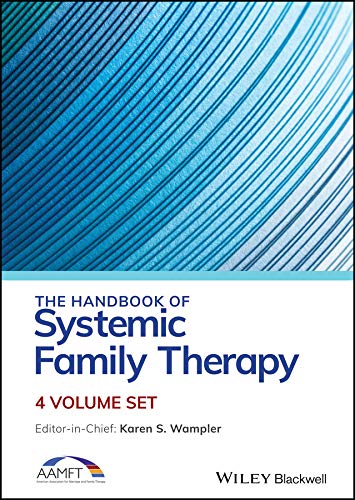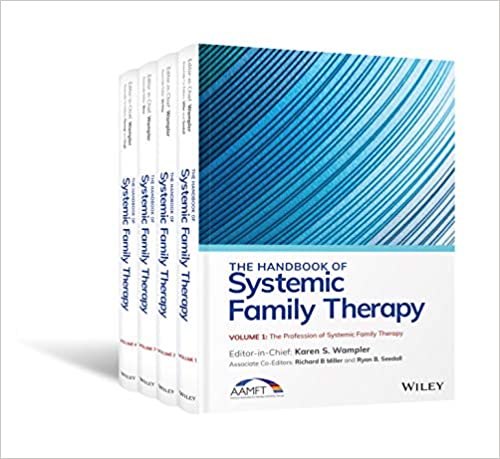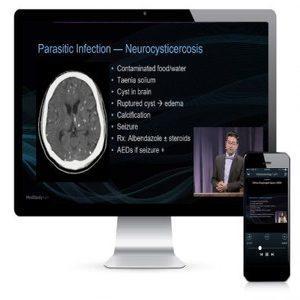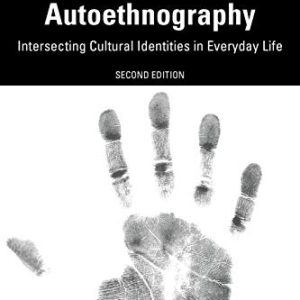Description
4th Edition
A first of its kind resource for clinicians, researchers, educators, graduate students, and policymakers, this authoritative four-volume Handbook of Systemic Family Therapy is a ground-breaking reference work on both the profession and the practice of systemic family therapy. The Handbook integrates the scholarly literature on systemic interventions focused on children, couples, and families into a single resource. Volume 1 includes critical information on the theoretical, practice, research, and policy foundations of the profession of systemic family therapy and its roles in an integrated health care system. Topics in Volume 2 (children and adolescents), Volume 3 (couples), and Volume 4 (family over the lifespan) reflect established and emerging interventions for the core difficulties in relationships that impact the mental and physical health of individuals, couples, and families. Contributors provide a balanced, integrative, and forward-looking analysis of the research, theory and interventions related to their topic illustrated with clinical examples. Particular attention is paid to cultural and family diversity throughout the work.
From the Inside Flap
« This four-volume handbook captures the breadth, depth, and creative applications of systemic family therapy today and the healing potential of couple and family systems. The editors’ coherent organization includes overarching foundations, practice models of relational treatment for children, adolescents, couples, and families, and research foundations, with a global perspective and attention to cultural diversity throughout. » —Fred P. Piercy, PhD, Professor Emeritus, Virginia Tech University This four-Volume Set Redefines The Profession and Practice of Systemic Family Therapy, Organizing Material By Presenting Issue Rather Than Intervention. A first of its kind resource for clinicians, researchers, educators, graduate students, and policymakers, this authoritative four-volume handbook is a ground-breaking reference work on both the profession and the practice of systemic family therapy. The Handbook integrates the scholarly literature on systemic interventions focused on children, couples, and families into a single resource. Volume 1 includes critical information on the theoretical, practice, research, and policy foundations of the profession of systemic family therapy and its roles in an integrated health care system. Topics in Volume 2 (children and adolescents), Volume 3 (couples), and Volume 4 (global health issues) reflect established and emerging interventions for the core difficulties in relationships that impact the mental and physical health of individuals, couples, and families. Contributors provide a balanced, integrative, and forward-looking analysis of the research, theory and interventions related to their topic illustrated with clinical examples. Particular attention is paid to cultural and family diversity throughout the work.
From the Back Cover
« This four-volume handbook captures the breadth, depth, and creative applications of systemic family therapy today and the healing potential of couple and family systems. The editors’ coherent organization includes overarching foundations, practice models of relational treatment for children, adolescents, couples, and families, and research foundations, with a global perspective and attention to cultural diversity throughout. » —Fred P. Piercy, PhD, Professor Emeritus, Virginia Tech University This four-Volume Set Redefines The Profession and Practice of Systemic Family Therapy, Organizing Material By Presenting Issue Rather Than Intervention. A first of its kind resource for clinicians, researchers, educators, graduate students, and policymakers, this authoritative four-volume handbook is a ground-breaking reference work on both the profession and the practice of systemic family therapy. The Handbook integrates the scholarly literature on systemic interventions focused on children, couples, and families into a single resource. Volume 1 includes critical information on the theoretical, practice, research, and policy foundations of the profession of systemic family therapy and its roles in an integrated health care system. Topics in Volume 2 (children and adolescents), Volume 3 (couples), and Volume 4 (global health issues) reflect established and emerging interventions for the core difficulties in relationships that impact the mental and physical health of individuals, couples, and families. Contributors provide a balanced, integrative, and forward-looking analysis of the research, theory and interventions related to their topic illustrated with clinical examples. Particular attention is paid to cultural and family diversity throughout the work.
About the Author
Karen S. Wampler, PhD, retired as Professor and Chair of the Human Development and Family Studies department at Michigan State University. She previously served as Department Chair, Marriage and Family Therapy (MFT) Program Director, and the C. R. and Virginia Hutcheson Professor at Texas Tech University. Prior to that, she developed and directed the MFT Program at the University of Georgia. Her research focused on applying attachment theory to couple interaction, family therapy process research, and observational measures of relationships. A past editor of the Journal of Marital and Family Therapy, she received the AAMFT Contribution to MFT, NCFR Distinguished Service to Family Therapy, and NCFR Kathleen Briggs Mentor Awards. Richard B Miller, PhD, is Chair of the Sociology Department, a former Director of the School of Family Life, and a former Associate Dean in the College of Family, Home, and Social Science at Brigham Young University (BYU). He is also a professor in the Marriage and Family Therapy (MFT) Program at BYU. Prior to teaching at BYU, he taught at Kansas State University for 11 years, serving as Director of the MFT Program. His program of research focuses on therapist effects and qualities of effective therapists. He has published over 100 journal articles and book chapters, and, along with Lee Johnson, edited Advanced Methods in Marriage and Family Therapy Research. Ryan B. Seedall, PhD, is associate professor in the Marriage and Family Therapy Program at Utah State University, having received his training from Brigham Young University (MS) and Michigan State University (PhD). He is an AAMFT Approved Supervisor and Clinical Fellow. His research focuses on understanding and improving relationship and change processes through examining interaction and support processes. He is also interested in protective family dynamics and prevention, including ways to reduce mental health disparities. He has conducted research on identifying specific interventions that are useful when working with couples (e.g., enactments) and therapist- and client-related factors that are strongly associated with process and outcome in therapy. Lenore M. McWey, PhD, is a Professor and Director of the Marriage and Family Therapy Program at Florida State University. She is a Licensed Marriage and Family Therapist and American Association for Marriage and Family Therapy Approved Supervisor. Her National Institutes of Health (NIH) funded research focuses on children and families involved with the child welfare system, and the results of her work have been published widely in high impact journals. She currently serves as a scientific reviewer for the Health, Behavior, and Context Subcommittee of the Eunice Kennedy Shriver National Institute of Child Health and Human Development of NIH. Dr. McWey has been the recipient of the Florida State University Distinguished Teacher of the Year and Outstanding Graduate Faculty Mentor awards. Adrian J. Blow, PhD, works as a couple and family therapy intervention researcher and educator at Michigan State University. Adrian is a Professor and Chair in the Human Development and Family Studies department and a core faculty member of the Couple and Family Therapy program. He studies families and trauma, military families, resilience processes in couples, and change processes (common factors) in interventions pertaining to Systemic Family Therapy. He has acquired over 2 million dollars in research grants as Principal Investigator and has published numerous peer-reviewed articles and book chapters. He has mentored many students and in 2017 was awarded the American Association for Marriage and Family Therapy Training Award, which recognizes excellence in family therapy education. Mudita Rastogi, PhD, practices at Aspire Consulting and Therapy as a Licensed Marriage and Family Therapist, grant consultant, coach, and educator. She is an AAMFT Approved Supervisor and Clinical Fellow, having practiced in both India and the US. She is a former Professor at the Illinois School of Professional Psychology, Program Director for the SAMHSA-funded Minority Fellowship Program at AAMFT, Associate Editor for the Journal of Marital and Family Therapy, Editor of Multicultural Couple Therapy and Voices of Color, and Associate Editor for the Encyclopedia of Couple and Family Therapy. She is a founding member of the Indian Association for Family Therapy, with interest in diversity, inclusion, global mental health, parenting, and child-free couples. Reenee Singh, DSysPsych, is the Chief Executive of the Association of Family Therapy and Systemic Practice in the UK. She is a Consultant Family and Systemic Psychotherapist, currently working at the Child and Family Practice, where she founded the London Intercultural Couples Centre and serves as a Director. Reenee is a Visiting Professor in the School of Psychology, University of Bergamo, Italy, and is the past editor of the Journal of Family Therapy. She is the author of three books (one forthcoming) and numerous academic publications in the areas of « race, » culture, and qualitative research. Reenee has taught worldwide and presents her research at national and international conferences.
Seuls les clients connectés ayant acheté ce produit ont la possibilité de laisser un avis.






1 avis pour The Handbook of Systemic Family Therapy, 4-Volume-Set 4th Edition
Il n’y a pas encore d’avis.